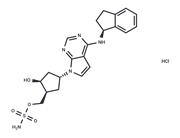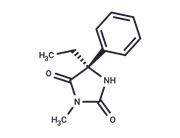| Name | Pevonedistat |
| Description | Pevonedistat (MLN4924) is a potent and selective NEDD8 activating enzyme (NAE) inhibitor (IC50=4.7 nM) with therapeutic potential for myelodysplastic syndromes (MDS) and antitumor activity. |
| Cell Research | MLN4924 is dissolved in DMSO and stored, and then diluted with appropriate medium before use[1]. HCT-116 cells grown in 6-well cell-culture dishes are treated with 0.1% DMSO (control) or 0.3 μM MLN4924 for 24 h. Whole cell extracts are prepared and analysed by immunoblotting. For analysis of the E2-UBL thioester levels, lysates are fractionated by non-reducing SDS-PAGE and immunoblotted with polyclonal antibodies to Ubc12, Ubc9 and Ubc10. For analysis of other proteins, lysates are fractionated by reducing SDS-PAGE and probed with primary antibodies as follows: mouse monoclonal antibodies to CDT1, p27, geminin, ubiquitin, securin/PTTG and p53 or rabbit polyclonal antibodies to NRF2, Cyclin B1 and GADD34[1]. |
| Kinase Assay | Bcl-2 Binding affinity calculation: A predicted binding affinity for Obatoclax binding to BCL-2 is calculated using the SIE scoring function. [4] As a control in determining the reliability of the calculation, predicted binding affinities Ki) are calculated for a set of 12 small molecules with experimentally measured binding affinities to BCL-2. |
| In vitro | METHODS: Nine neuroblastoma cell lines were treated with Pevonedistat (12-1000 nM) for 72 h. Cell viability was measured by MTT.
RESULTS: All neuroblastoma cell lines tested were sensitive to Pevonedistat with IC50 values ranging from 136-400 nM. [1]
METHODS: Human colorectal cancer cells HCT-116 were treated with Pevonedistat (0.001-3 μM) for 24 h, and the expression levels of target proteins were detected by Western Blot.
RESULTS: Pevonedistat treatment resulted in a dose-dependent decrease in Ubc12-NEDD8 thioester and NEDD8-cullin couplings, leading to an increase in the abundance of known CRL substrates CDT1, p27 and NRF2. [2] |
| In vivo | METHODS: To detect anti-tumor activity in vivo, Pevonedistat (30-60 mg/kg in 10% cyclodextrin) was injected subcutaneously into BALB/c mice harboring the human colorectal cancer tumor HCT-116 either once or twice daily for twenty days.
RESULTS: Pevonedistat inhibited the growth of HCT-116 xenograft tumors. [2]
METHODS: To assay in vivo antitumor activity, Pevonedistat (60 mg/kg, intraperitoneal injection, once daily), venetoclax (50 mg/kg, oral administration, once daily), and azacitidine (8 mg/kg, intravenously three times every seven days) were administered to NSGS mice harboring the AML tumor OCI-AML2-Red- Fluc for fourteen days.
RESULTS: Pevonedistat/venetoclax/azacitidine triple therapy induced durable responses in a systemic xenograft model of acute myeloid leukemia. [3] |
| Storage | store at low temperature | Powder: -20°C for 3 years | In solvent: -80°C for 1 year | Shipping with blue ice. |
| Solubility Information | DMSO : 125 mg/mL (281.83 mM), Sonication is recommended.
|
| Keywords | NEDD8-activating Enzyme | MLN-4924 | Inhibitor | Pevonedistat | MLN 4924 | inhibit | NAE |
| Inhibitors Related | NSC697923 | PYZD-4409 | Nutlin-3 | NAcM-OPT | RG7112 | PYR-41 | BC-1382 | NSC232003 | NAE-IN-M22 | Indole-3-carbinol | Idasanutlin | Navtemadlin |
| Related Compound Libraries | Bioactive Compound Library | HIF-1 Signaling Pathway Compound Library | Anti-Cancer Clinical Compound Library | Drug Repurposing Compound Library | Inhibitor Library | Bioactive Compounds Library Max | Preclinical Compound Library | Anti-Cancer Compound Library | Anti-Cancer Drug Library | Anti-Cancer Active Compound Library |

 United States
United States



